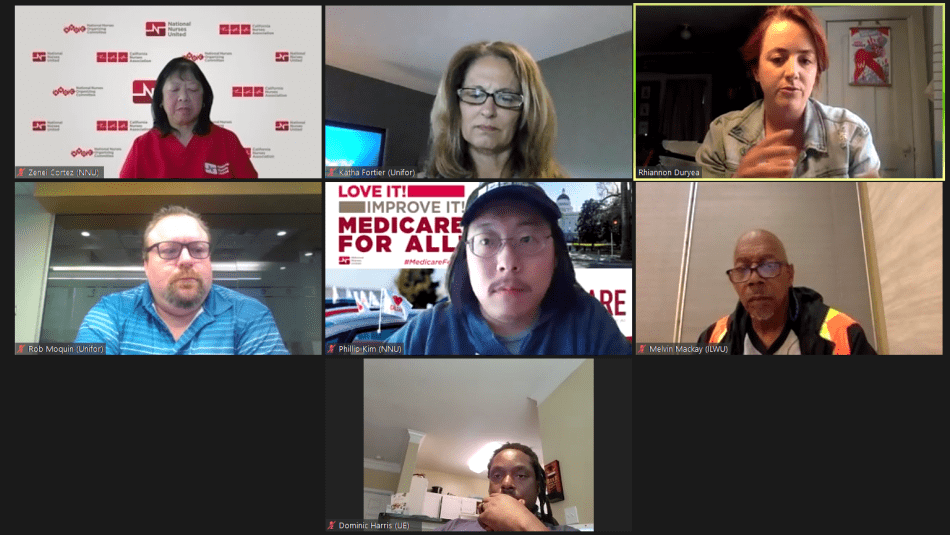
Share
Dominic Harris recalls his cousin cutting his hand open.
“He took Superglue and glued it because he didn’t want to go to the hospital,” he said.
“My other cousin tore his ACL and he’s now looking at a $6,000 bill to get an MRI, not including surgery. He has no insurance. If we had a universal health care system, everyone would be on the same level – whether you’re a judge or janitor.”
Harris, a member of United Electrical, Radio and Machine Workers of America, was among five panelists in the Everybody In, Nobody Out: Public Health Care For All webinar Wednesday evening, who all described wide gaps in health care systems in North America, exacerbated by COVID-19.
Working people across North America experience vastly different access to health care and for those who do not have privileged access; it could be the fine line between life and death.
“We really saw a humanitarian crisis in nursing homes. It really is tragic and for us in Canada, it’s pointed out the glaring differences between a for-profit system and a not-for-profit system,” said moderator Katha Fortier, Executive Assistant to Unifor National President Jerry Dias.
Rob Moquin, Unifor Local 39-11 Unit Chair, City Paramedics, said the public, politicians and unions need to advocate on behalf of those who don't have access to family physicians via walk-in clinics as a pressing health care issue in his Thunder Bay, Ont. community.
“There’s a community culture we need to change – that health care is for all, regardless of where you fall in status,” he said.
Melvin MacKay, an international executive board member for International Longshore and Warehouse Union, Local 10, offers a grim perspective for those facing insecure housing in the U.S.
“Here, in San Francisco, if you don’t have insurance, they don’t open the door,” he said. “We have a lot of homeless here that need medical attention. Some people get fired for assisting. It’s repulsive.”
Zenei Cortez, the president of the National Nurses United and the California Nurses Association, said she’s haunted by the more than 400 nurses who died during COVID-19 due to a lack of PPE at their workplaces.
She’s fighting for Medicare for all so every nurse is provided with adequate staffing levels, equipment and training they need to take care of patients. She often sees GoFundMe fundraisers launched just to pay for medical treatment.
“Despite the gains met by the Affordable Care Act in 2010 under President (Barack) Obama, there’s since 29 million people who have no health insurance and on top of that, we have 44 million who are underinsured, which means they can’t afford to use it because of expensive co-pays,” she said.
The path forward may be forged by replicating the U.K. system of Medicare, gaining a critical mass movement of working-class people who demand it and getting more politicians on board to openly say they are for Medicare for all, the panel said.
“I find a lot of people are afraid to access health care, knowing it may cost them money for medications after,” said Moquin.
“Unifor has a great stance on universal Pharmacare and I think that’s our next step in Ontario and Canada.”
Act now to support the call for universal Pharmacare. Add your name to a petition to the House of Commons today.


